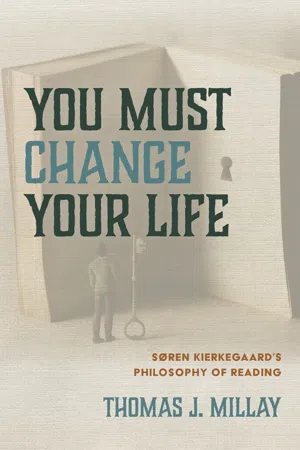![]()
4
Appropriation
“Appropriation”: to take something outside the self and make it one’s own. We do this all the time with food, by ingesting it and literally making it a part of our bodies. But we also do it with texts. Eugene Peterson, translator of The Message, once wrote a plea for this type of appropriative reading titled Eat This Book (alluding to how the prophet Ezekiel was once commanded to devour a scroll), and there are parallels between reading and eating: in both we are taking what is outside the self and spending time with it, working on it, to make it our own. Further, reading and eating are both activities that affect the way we live our lives, hopefully providing nourishment and causing growth.
Appropriation is a major theme in Kierkegaard’s writings. I will take a moment to describe what he means by it in a broader sense before turning to its more local importance in his philosophy of reading.
Kierkegaard’s most famous journal entry is about appropriation. If you are looking for one place to locate the birth of existentialist philosophy, you could do worse than the following lines:
Understanding this passage requires an extra measure of care. It is easy to think Kierkegaard is saying: some things are true for me, some things are true for you, and what’s important is that you find your truth. This sort of view is usually summarized with the phrase “all truth is relative,” meaning that there is no one truth, no objective truth, but simply a variety of perspectival opinions. But that is not what Kierkegaard is saying.
Kierkegaard means to say that, of all the truth that is objectively out there, he wants to find the kind of truth that he can make his own, a truth that will cause a change in the way he lives his life. He wants not only to learn but to grow, in an existential sense: to become a single individual, someone who does not simply rely on what others tell him, but is passionately committed to the encounter with truth that he himself has had, apart from all others.
The context for the passage is important. Kierkegaard wrote these words just before he began his Master’s work, when he was trying to figure out what field he should enter. He eventually chose philosophy, but this doesn’t mean Kierkegaard thinks philosophy is the “correct” field. It was the correct field for him. The important question is: what is the field within which I could spend my entire life pursuing its truths and never weary? And how would these truths affect my life—what shape would they give it, if I really appropriate what I discover? These are questions of personal inclination that cannot be answered by Kierkegaard. Instead of an answer, here Kierkegaard points us to the right question: is this the truth for me?
Another way to put this is that Kierkegaard does not undermine the objective character of truth, but emphasizes the importance of its subjective appropriation. In Concluding Unscientific Postscript, published about thirteen years after the “Gilleleje” journal entry referenced above, Kierkegaard develops this emphasis on appropriation at length via his concept of “subjectivity.” He explains the concept of subjectivity by reflecting on what it means for an individual to have faith.
Christian faith involves an objective knowledge-claim: at a certain point in history, God became an individual human being. This claim, though objective, cannot be known with certainty. We were not there in first-century Palestine; and even if we were, Christ’s divinity is cloaked by his indistinguishable humanity (what Kierkegaard calls his “incognito”). To have faith is to hold with subjective passion that an objective uncertainty is the truth. Thus, one takes what is an uncertain truth and bases the rest of one’s life upon this “fact”: this is what appropriation looks like when dealing with matters of faith. “[T]ruth,” as Kierkegaard puts it, “is the self-activity of appropriation”; it is taking a truth outside the self and making it truth for me, the basis of how I conceive my self-identity and the guide for all decisions I come to make.
For the Christian, appropriation means relating to the incarnation of God in Jesus Christ with an infinite passion, even if such a fact is uncertain:
The thought of God, and the person of Jesus Christ—whom we read about in the Gospels—is appropriated this way. The person of faith has an absolute dedication to what remains absolutely uncertain. Other truths have different modes of appropriation, their own modes which are appropriate to them, a...
